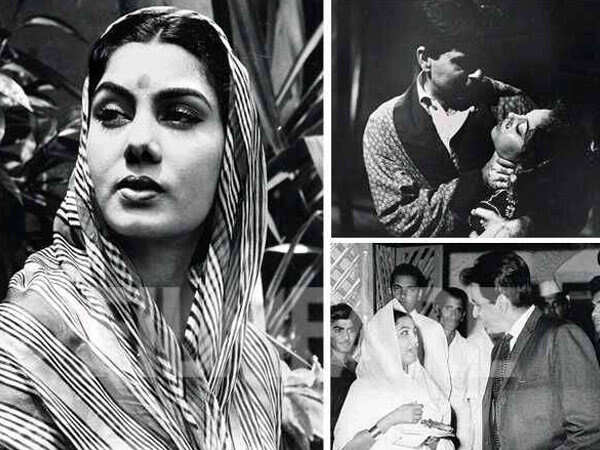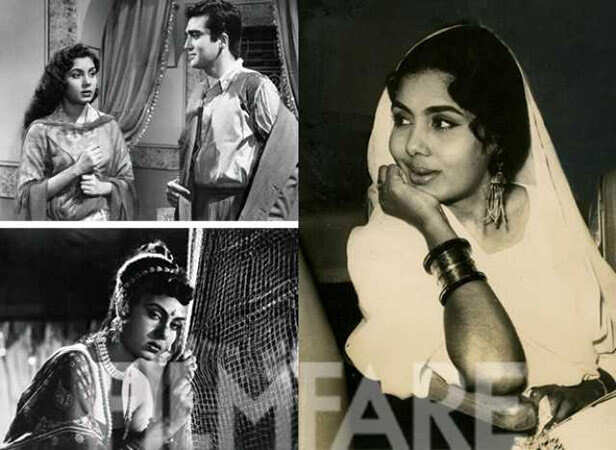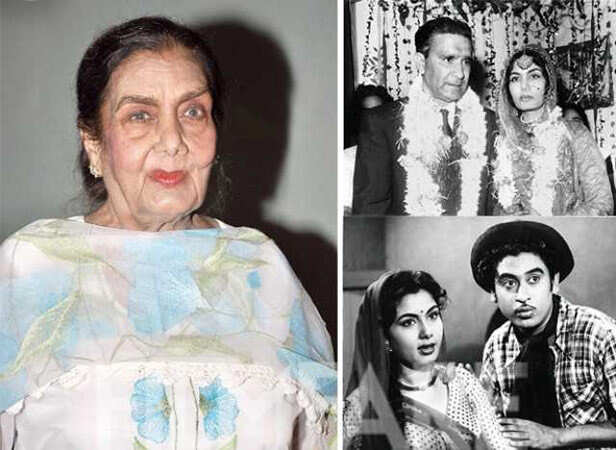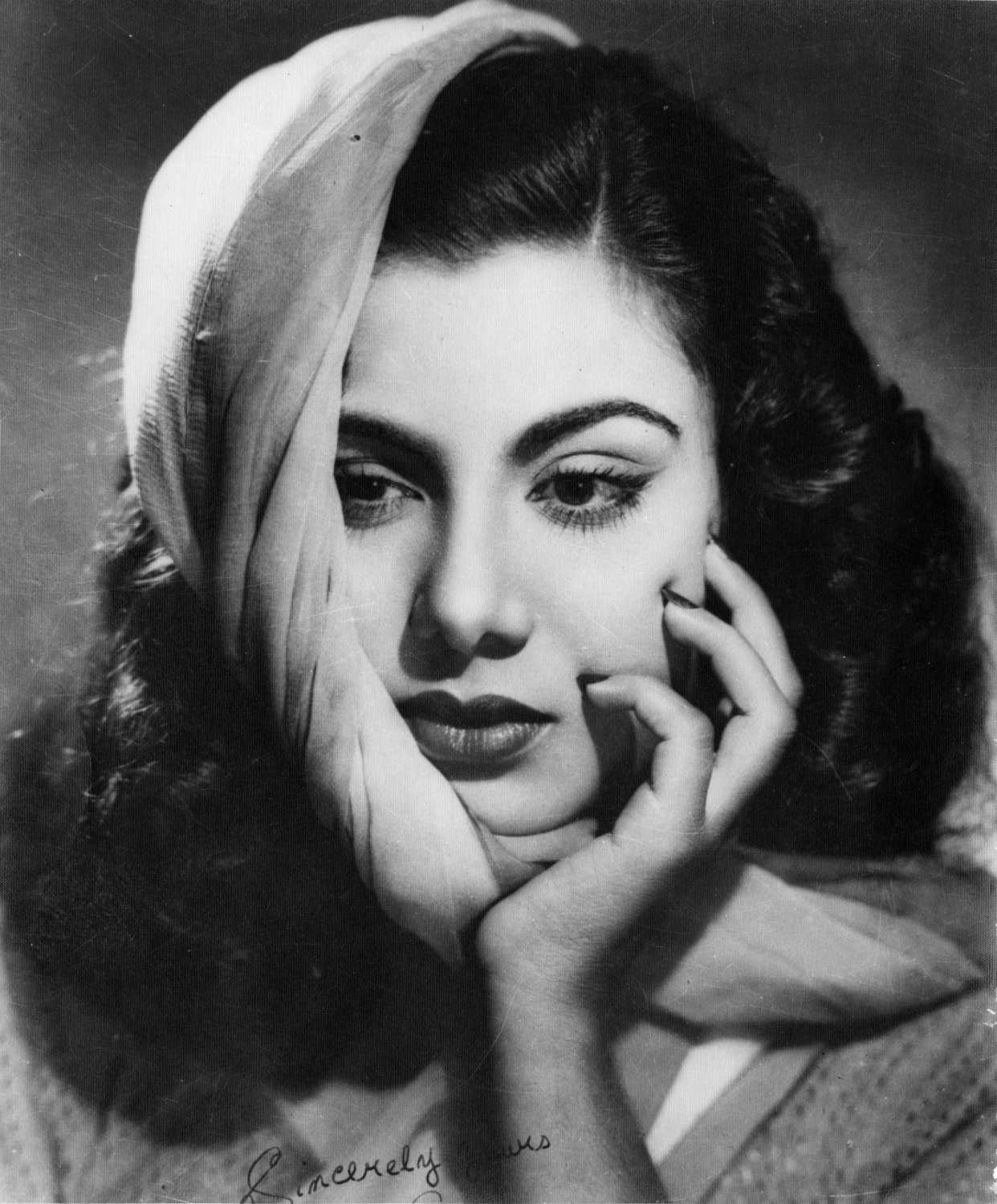Fatahbad (Agra), UTTAR PRADESH / Mumbai, MAHARASHTRA :

Veteran actress Nimmi passed away in a local hospital in Mumbai on March 25, 2020. She was 88 and had been ailing for some time. The last rites of the actress took place this afternoon. Nimmi acted in films from 1949 to 1965 and has some memorable films to her name like Barsaat, Aan Udan Khatola, Basant Bahar Mere Mehboob and Love and God. The actress’ captivating smile still remains fresh in the minds of the audience. As an ode to her, Filmfare presents to you our last interview with her, read on…
She’s the last of the begums. The golden girl of the golden era. The 1950s… where music, poetry, romance… all serenaded hope in a neo-independent nation. In an age, dominated by statuesque beauties like Nargis, Madhubala, Meena Kumari and Vyjayanthimala, came in the petite and crystal-eyed Nimmi. The second lead in Barsaat, she walked away with all the hit songs and the sympathy. While she went on to play heroine to Raj Kapoor and Dev Anand, it was her tragic chemistry with Dilip Kumar in Deedar, Daag, Amar and Udan Khatola that made her the delight of the ticket-window and tabloids. The larger-than-life histrionics eventually gave way to mellow performances in films like Sohrab Modi’s Kundan and V Raman’s Bhai Bhai. K Asif’s colossal but time-lagged love and God is remembered perhaps for an odd reason – the stills of the film remain the hard copies of Nimmi’s beauty.
Today, her face holds a resonance of yesterday. The Lucknowi Urdu, is intact and so is her penchant for shayri. She laughs as she reveals her unabashed admiration for Dilip Kumar, her vibe with Raj Kapoor. Yet there’s no clinging to the past. No tales of heartbreak define her narrative. Having lost her writer husband S Ali Raza in 2007, she’s accepted the reality of living alone. The emotion that emboldens her is gratitude. “For an artiste, the saddest, the most miserable thing is when people no longer recognise you. Khuda ka shukr hai… someone or the other recognises me when I step out.”

With Sunil Dutt in Kundan (top) and Nimmiji in Anjali (bottom)
Train from Agra
To escape the volatile atmosphere post Mahatma Gandhi’s assassination in 1948, 15-year-old Nawab Banoo (Nimmi’s original name) with her grandmother, left Fatahbad near Agra for Mumbai. “Nana (grandfather) told nani, ‘Take Lali (her pet name) to Bombay’!” recalls Nimmi who had lost her mother, singer/actress Wahidan at the age of 10. The two stayed with Nawab’s aunt, actress Jyoti, married to musician/filmmaker GM Durrani. Later, they approached Mehboob Khan for help, since Nimmi’s mother, Wahidan, had worked with him. The legendary filmmaker put them up in a spare room. “It was comfortable. But the toilet was outside. My servant would stand in the queue and call out when my chance came,” she laughs.
Barsaat of offers
Those days Mehboob Khan was shooting Andaz (1949) with Raj Kapoor, Nargis and Dilip Kumar. Once, Nimmi and her grandmother visited the set to watch the shooting. “Nargis’ mother, Bibiji (Jaddanbai), was also present. On seeing her, Rajji (Kapoor) rushed to touch her feet. He saw me sitting next to her and asked, ‘Aye ladki naam ky hai tumhara?’ It took me five minutes to utter my name,” she recalls. Raj Kapoor was looking for a fresh face for Barsaat (1949). Something about the unrehearsed Nimmi appealed to him. “Few days later he sent across a posh car and asked me to come for an audition. I was so nervous that I started crying during the test. Rajji thought that I was such an emotional artiste,” she smiles.
Raj gave her the screen name Nimmi and cast her as the mountain girl who dies heartbroken in Barsaat. “Initially, I was scared of Rajji. To make me comfortable, one day, he got a kalawa (a coloured thread) and said, ‘Do you understand the meaning of rakhi? Tie this thread on my hand’. Since then I tied a rakhi to Rajji every year.” The film’s title song Barsaat mein hum se mile and others like Jiya bekarar hai, Hawa me udta jaaye and Patli kamar hai were filmed on her. Later Sazaa and Aandhiyan with Dev Anand endorsed her viability. “I never saw Dev Anand idle on the set. He only spoke when necessary and with respect. After the shot, he’d go to his make-up room,” she remembers.
The ‘Un-kissed Girl of india’
Her big ticket film however was Mehboob Khan’s Aan (1952) with Dilip Kumar, Prem Nath and Nadira – a film evocative of Quo Vadis. Reportedly, the first edit of the film had Nimmi’s character, Mangala, die early. But on the demand of distributors, a dream sequence was added to give her more screen time. At the London premiere of the film, Western film personalities, including Errol Flynn, were standing to receive the team. “On seeing me, Errol bent down to kiss my hand. I pulled it away saying, ‘Don’t you know I’m an Indian girl?’ The next day newspapers carried the headline, ‘The un-kissed girl of India’,” she laughs. Given her fame the English version of Aan was titled Savage Princess. When the film was dubbed in French, it was titled Mangala, Fille des Indes (Mangala, Girl Of India). “I received a couple of Hollywood offers including from Cecil B DeMille but I wasn’t interested.”

A recent picture of Nimmi, With husband and writer S Ali Raza (on top) and with Kishore Kumar in Bhai Bhai (bottom)
Girl talk
She later did Mehboob Khan’s Amar (1954) where she played a milkmaid raped by a lawyer (Dilip Kumar). Narrating an incident regarding Meena Kumari who was initially to be part of Amar. She says,“One day at Central Studio, I found Meena Kumari sitting on a bench crying. ‘I wanted to do this film’,” she said. “Meenaji was slated to play Madhubala’s role in Amar but her dates were clashing with Kamal Amrohi saab’s film.” Years later, Nimmi did Char Dil Char Rahen (1959) with the actress. Though she says, “Sabse zyada dosti Nargis se thi,” Nimmi shared a warm equation with others too. “There was a rule that no one could sit on Madhubala’s chair. But one day, during the shoot of Amar, I happened to sit on it. My maid nudged me saying, “She’s come, get up!” On seeing me, Madhubala said, ‘Sit’. We grew friendly. Her skin was velvety. She had a long Iranian nose. She was tall and had beautiful hands and feet. Her eyes were ordinary but her smile was extraordinary. Lipstick suited her,” she says of the actress.
The Dilip Kumar saga
Like others, Nimmi too was awed by thespian Dilip Kumar’s acting skills. “He internalised a scene. That’s why his shot looked natural. He had scholarly knowledge on all subjects. He could express things beautifully. He’s a miracle of nature.” The duo did five films together in the ’50s, Aan, Amar, Deedar, Daag and Uran Khatola. While their ill-fated love on screen wowed audiences, off-screen too there were rumours linking them up. She explains the ‘attractiveness of his personality’, “God has blessed Dilip saab with a maqnatis (magnet). Everyone got pulled towards him. In fact, one maharani was willing to leave her all to be with him. I will not deny that I was also pulled towards him. Mujhe bhi woh bahut pasand the. Unke aashiq hum bhi the. I was his fan too,” she gushes. “Beautiful women – like Madhubala and others were in love with him. How could I ever be at par with them? I’d have been left heartbroken had I desired something unattainable. I stayed away from any such thought.”
She elaborates, “Once we were shooting a scene for Aan where I, seated on a horse, had to throw a sword to Dilip saab. The tip of the sword hurt him. I was apologetic. But in his poetic style he said, ‘Hum sochenge zindagi mein ek chot aur khayee (I’ll consider it as yet another wound in life)’. On hearing this any girl would have been floored. That night I too kept thinking about it. I’m not an angel, I’m human after all. But I collected myself thinking ‘how can he ever like me. I’m so ordinary’.” Her realistic stance, she insists, is the reason that she enjoys a ‘beautiful friendship with Saira Banu and him’ today.
Later years
Career wise, an ambitious Nimmi produced the film Danka (1954). Kundan (1955) with Sunil Dutt, gave her a double role as a mother and daughter. But in the ’60s, a few wrong choices harmed her career. She rejected films like BR Chopra’s Sadhna and Raj Khosla’s Woh Kaun Thi? both of which did wonders for Vyjayanthimala and Sadhana respectively. “Mujh pe shaadi ka bhoot sawaar tha. I refused films in the hope of getting married. I even refused Saraswati Chandra though my costumes were ready,” confides the actor who was in love with writer S Ali Raza who had written the dialogue for her Barsaat, Aan and Amar. “Raza saab wanted to become a filmmaker. He wanted to prove himself before marrying me.” She was also offered the lead in Mere Mehboob but she opted for the sister’s role believing it to be more important. With actors like Sadhana, Nanda, Asha Parekh, Saira Banu and Mala Sinha making headway, Nimmi opted for offbeat roles such as that of the blind girl in Pooja Ke Phool (1964) and Ashok Kumar’s mute wife in Akashdeep (1965), which was technically her last film.
One film that remains significant in her career, albeit for other reasons, is K Asif’s Love And God (1986). It took 26 years to complete. “Love And God was first shot in black and white with Bharat Bhushan. But later, Mughal-E-Azam took precedence. It was then restarted with Guru Dutt. For seven years it remained in the cans. Then Guru Dutt passed away. So Asif saab took Sanjeev Kumar. But then Asif saab passed away. Later it was edited heavily. The final print seemed a cut paste job,” she laments.
MARRIAGE and more
She gives a realistic perspective on her marriage. “No husband performs aarti of his wife – whether you are Queen Elizabeth or a star. You have to nibhao. Khushi and ranjh is part of life. It’s not that I never felt sad. I missed work. Reza saab used to write during the day and in the evening he’d enjoy his drinks with his friends. Main bewakoof ne kaam chodh diya tha. But I enjoyed looking after my bungalow in Worli.” She never stopped dreaming though. “I wanted to launch my production house.
I wanted Raza saab to be a director like Kamal saab.
I was ambitious, he was the opposite. But with time I resigned. I didn’t want trouble in my marriage.” Later, the couple shifted to an apartment in Juhu. “Here, he was diagnosed with blocked arteries. Raza saab passed away in 2007.” The couple didn’t have children. But she’s been mother to her sister’s son. “My younger sister passed away young. Her last wish was that I bring up her son. So I brought Parvez here from Pakistan,” shares Nimmi whose Barsaat was to release then. “He lives in the UK with his family now,” says Nimmi revealing the most laudable role of her life.
source: http://www.filmfare.com / Filmfare.com / Home> Features / by Farhana Farook / March 26th, 2020









